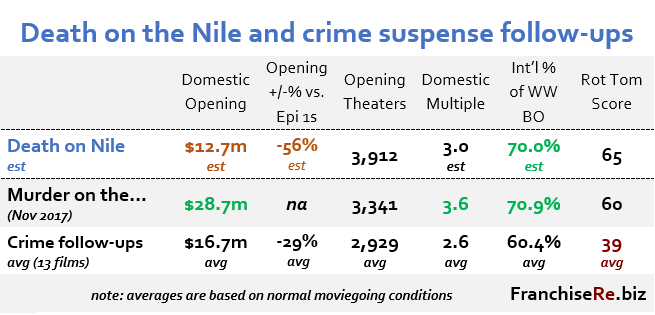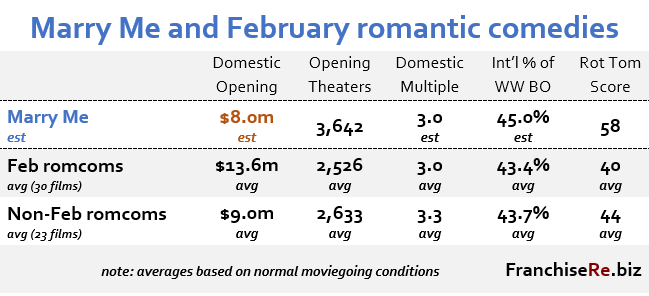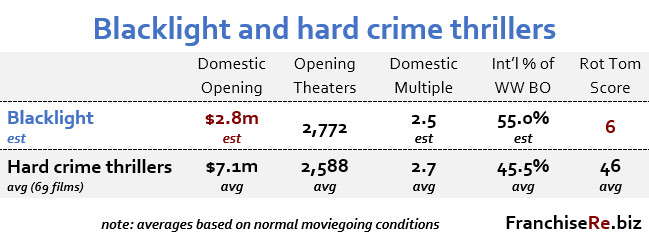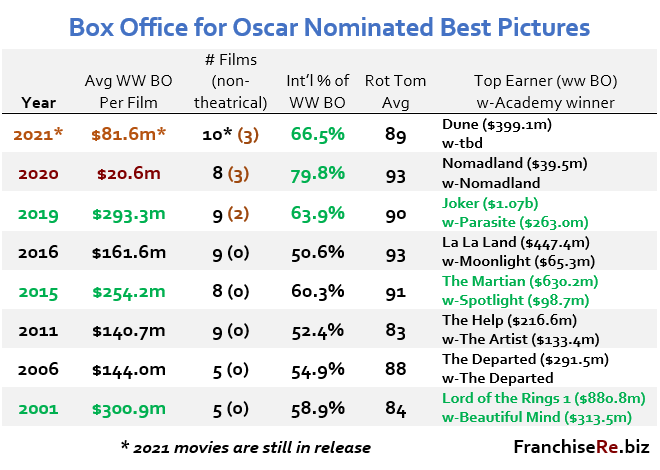DEATH ON THE NILE opening | MARRY ME opening | BLACKLIGHT opening | Oscar nominated films | February 11 to 13, 2022 weekend
Opening weekend box office numbers and commentary
The current weekend: February 11 to 13, 2022 (Valentine’s Day)
1) Death on the Nile opening
- This is a fair opening, with a couple of asterisks. Super Bowl weekend is consistently down in overall business compared with other weekends, and we're still coming off an enormous Omicron surge that peaked in mid-January. New cases are dropping now, but they're still high and a major deterrent to moviegoing.
- Death on the Nile is a follow-up to a hit, but it's less than half of Murder on the Orient Express's start (the average drop for a crime suspense follow-up is -29%). At a cost of $90m, the movie will need strong overseas business. (House of Gucci was original material on the big screen, which is why its $14.4m domestic opening was relatively more impressive.):
2) Marry Me opening
- This is also a fair opening. Romantic comedies have a strong Valentine tradition. The opening is below average for a February romantic comedy, and just shy of average for a non-February romcom. Women, particularly older women, have been slower than others to return to moviegoing, and they are showing it again, here.
- Marry Me is also available to stream on Peacock, and whether anyone watches it there, advertising it as available on TV is a disincentive to go out and see it. The budget was reasonable ($23m), so the movie should not lose money:
3) Blacklight opening
- This is a weak opening. Crime thrillers are a workhorse genre and Liam Neeson is in a lot of them. The bar is as high as it's ever been for moviegoing, and this sort of standard fare is not going to stand up to current conditions. Reviews are poor:
4) Oscar nominated films
- After wiping out last year, the box office for this year's Oscar films has returned to levels that parallel the current market — about half of a typical year. Much of it was driven by one film, Dune ($399.1m worldwide). Like most years, the best picture nominees have done very modest business, with a big hit mixed in (occasionally there are two).
- The longer range concern is whether, in the future, we will have a middle class of commercially successful, interesting, character-driven Oscar-nominated movies. Films like Little Women ($216.6m, 2019), A Star Is Born ($436.2m, 2018), The Revenant ($533.0m, 2015), American Sniper ($547.4m, 2014), and Lincoln ($275.3m, 2012), et al. Those movies are missing right now:
- Every year there is talk about the popular appeal of the nominated films — or lack of appeal — and how it impacts interest in the Academy Awards show. Is the industry overlooking mainstream taste? Academy members are going to vote for what they think is the best work, regardless of what other people think. That is how it should be; this is not the Golden Globes.
- Expanding the best picture category to more than five nominees was a positive step to include more work and different tastes. It's democratic and fair, and yes, it helps generate more interest. A flexible number of nominees in other categories would also broaden interest, and there would be fewer snubs of great work simply because the magic number is five.
- But the Academy faces an impossible obstacle: the 3-hour+ length of the Awards show. The show can't possibly cover more material. Abbreviate something? The show is already as tight as it can be. Break it up? No. Add an earlier step — first, ten nominees, and then five finalists? Right now, the length of the show determines any change in the awards. The show cannot go longer, and nothing is going to be cut, so there's little room to maneuver.











